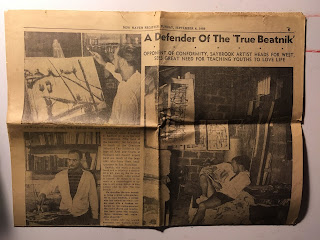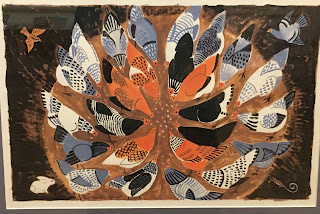MONDAY, MARCH 4--Last night I got to do something I love to do: sit in the dark, surrounded (mostly) by strangers, watching a movie. It is especially lovely to do this -- what feels like such a commonplace luxury -- in a small venue and community like Portland's SPACE Gallery.
Having handed out show info, greeted patrons, and introduced not only the film but the film's raison d'etre -- the Trocks are coming! the Trocks are coming to Maine via Portland Ovations! March 28 - 29 -- I'm sitting in the second row alongside a colleague who happens, similarly to the movie's subjects, to be a dancer who is also an excellent comedian.
We've both cried four times at least during Rebels on Pointe, a documentary of Les Ballets Trockadero de Monte Carlo -- the first documentary, in fact, of this notoriously fun and skilled male drag ballet company founded over 40 years ago, rising out of Stonewall and Charles Ludlam's Ridiculous Theater Company. Any evening on which you are moved to tears multiple times by art is a great night.
I can't remember now all the scenes that moved us to tears; there were many. Maybe one time it was the young, beautiful dancer from Cuba (Carlos Hopuy) describing how he and his family (and, basically, everyone) were starving during the 1990's; and how much he wants his mother, also a dancer, to be able to get out of Cuba to come see him dance. Maybe it is the sweet faced dancer-turning-educator as he heads into his 40's, going home regularly to northern Italy between tours to visit his dad, who has Parkinson's disease. Maybe it is when the first young Trocks couple gets married -- something neither Trocks' Artistic Director and retired dancer Tory Dobrin nor I thought we would ever see in our lifetimes. Most likely for me, it is when Dobrin talks about losing half the company to AIDS during the epidemic period of the 1980's-90's -- including his own partner. I remember too well when gay men were dying all around us, every day.
And that's one of the amazing things about the Trocks: their history spans a remarkable 40 years of gay history as an integral part of their own. The up's and down's of the dancers, the support of their families, the company's growth and evolution, their rock star status in Japan: it's all within the context of queer history and male dancers in drag satirizing one of our most elite performing arts forms -- ballet.
The comedy and satire the Trocks bring to ballet ironically "normalizes" what has become, for too many, an inaccessible form. They bring ballet down to earth both with their incredible skill on pointe and their commentary on the form itself -- and of course, their humor. Broad understanding is best fed by laughter.
SPACE Gallery's screening of Rebels on Pointe was a generous collaboration with Ovations in the run up to the Trocks' arrival, and was sponsored by Maine AARP. Portland Ovations presents Les Ballets Trockadero de Monte Carlo at Merrill Auditorium on Friday, March 29. As part of our Ovations Offstage (O2) community programming around the performance you can also take advantage of the following activities and events:
Wednesday, March 27:
- 12 p.m., University of New England: Aging with Grace and Movement -- Health Challenges Faced by the LGBTQ Community, a collaboration with UNE and SAGE. FREE.
- 7:30 p.m., Austin Street Brewery: Drag Queen Bingo with Cherry Lemonade
Thursday, March 28:
Friday, March 29:
- 7 p.m. FREE pre-performance lecture, "Dancing Queens, How the Trocks Satirize Classical Ballet," with former Trock dancer and Maine resident Roberto Forleo, Merrill Auditorium
- 8 p.m. PERFORMANCE










